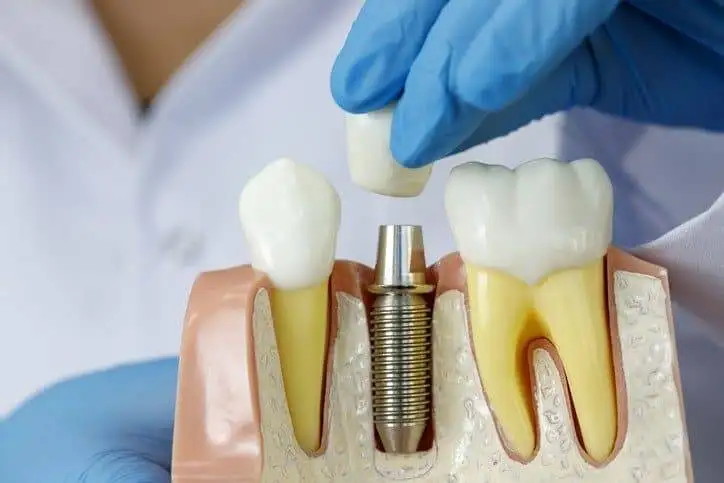Dental Implant
A dental implant is a surgical component that is placed into the jawbone to serve as an artificial replacement for a missing tooth root. Dental implants are typically made of titanium or other biocompatible materials that fuse with the jawbone over time, providing a strong and stable foundation for a replacement tooth or dental prosthesis. The process of getting a dental implant involves several steps. First, a dental implant is surgically placed into the jawbone, where it will fuse with the bone over a period of several months. Once the implant has fully integrated with the jawbone, an abutment is attached to the implant, which serves as a connector for a replacement tooth or dental prosthesis.
The replacement tooth or prosthesis is then attached to the abutment, providing a natural-looking and functional replacement for the missing tooth. Dental implants are used to replace a single tooth, multiple teeth, or even a full arch of teeth. One of the benefits of dental implants is that they provide a long-lasting solution for missing teeth, with many implants lasting for decades or even a lifetime with proper care. They also help prevent bone loss in the jaw, which can occur when a tooth is missing.
However, the process of getting a dental implant can be lengthy and may require multiple appointments and procedures. Dental implants also require good oral hygiene habits and regular dental check-ups to ensure their longevity. Overall, dental implants are an effective and popular option for replacing missing teeth and restoring oral health and function. It is important to consult with a dentist or oral surgeon to determine if dental implants are a suitable option for an individual’s specific needs and circumstances.
Reasons to Get Dental Implant:
There are several reasons why someone may choose to get a dental implant:
- Missing tooth: Dental implants are an effective option for replacing one or more missing teeth. Unlike dentures or bridges, dental implants are anchored directly into the jawbone, providing a permanent solution for missing teeth.
- Improved appearance: Missing teeth can cause changes to the structure of the face and can affect a person’s appearance. Dental implants can help restore the natural shape and appearance of the face and can improve a person’s confidence and self-esteem.
- Improved oral health: Missing teeth can make it difficult to properly clean the remaining teeth, leading to an increased risk of tooth decay and gum disease. Dental implants can help improve oral hygiene by filling in the gaps between teeth and preventing food from becoming trapped.
- Improved speech: Missing teeth can affect a person’s ability to speak clearly, causing slurring or mumbling. Dental implants can help improve speech by filling in the gaps between teeth and providing support for the tongue and lips.
- Improved chewing and eating: Missing teeth can make it difficult to chew food properly, leading to digestive issues and poor nutrition. Dental implants can help improve chewing and eating by providing a strong and stable foundation for chewing and biting.
Overall, dental implants can provide a long-term solution for missing teeth, improving both oral health and quality of life. It is important to consult with a dentist or oral surgeon to determine if dental implants are a suitable option for an individual’s specific needs and circumstances.
Benefits of Dental Implant:
Dental implant an artificial tooth root that is placed into the jawbone to support replacement teeth or bridges. There are number of benefits, including:
Improved Appearance: Dental implant look and feel like natural teeth. They are designed to blend in seamlessly with your existing teeth, so they can help to improve your smile and overall appearance.
Improved Speech: Missing teeth can affect the ability to speak clearly. Dental implant can help to restore your ability to speak clearly and confidently.
Improved Comfort: Dental implant is designed to be a permanent solution for missing tooth. They are more comfortable than removable dentures and do not cause irritation or soreness in the mouth.
Improved Oral Health: Dental implants can help to prevent further tooth loss by providing support to the remaining natural teeth. They also help to maintain the bone structure of the jaw.
Improved Eating: Missing tooth can make it difficult to eat certain foods. Dental implants function like natural teeth, allowing you to eat your favorite foods without any discomfort or difficulty.
Durability: Dental implants are durable and can last a lifetime with proper care. They are made of high-quality materials, such as titanium, that are strong and resistant to decay and damage.
Convenience: Unlike dentures, dental implants do not require special cleaning solutions or adhesives. They can be cared for just like natural teeth, with regular brushing and flossing.
Overall, dental implants offer a long-term solution for missing teeth that can significantly improve your quality of life.


